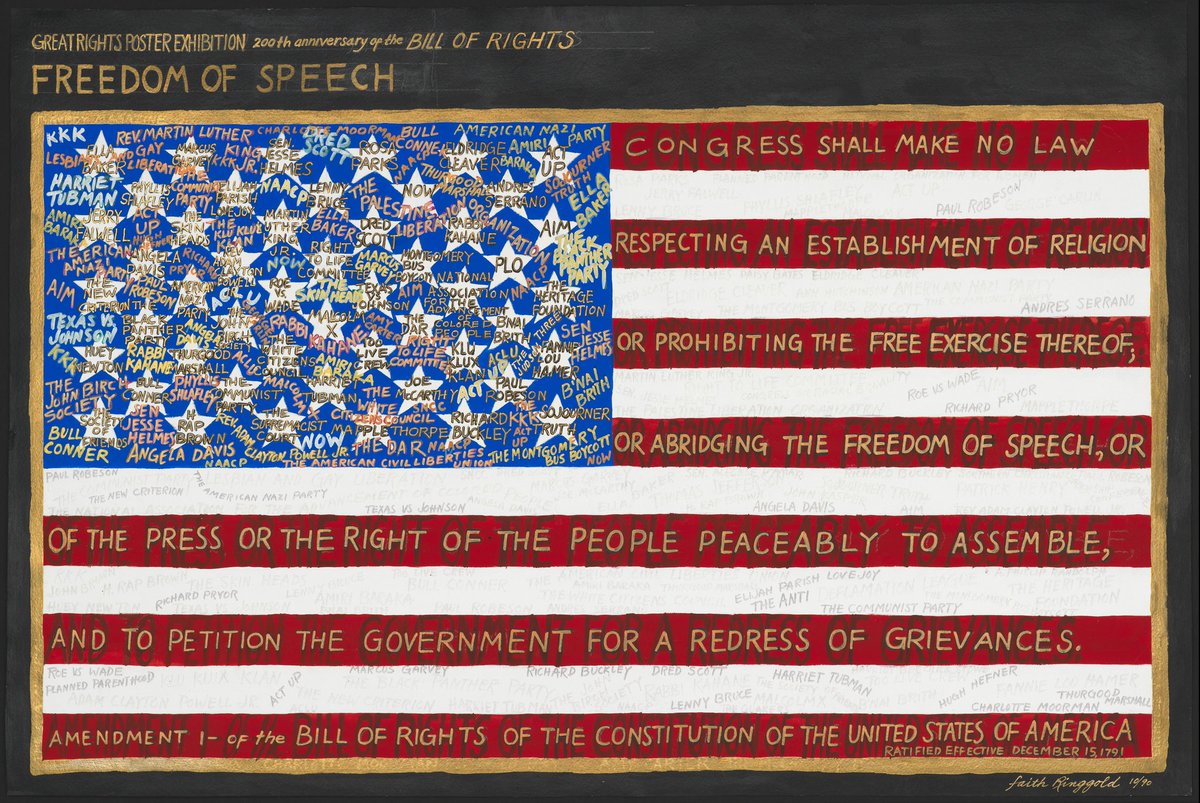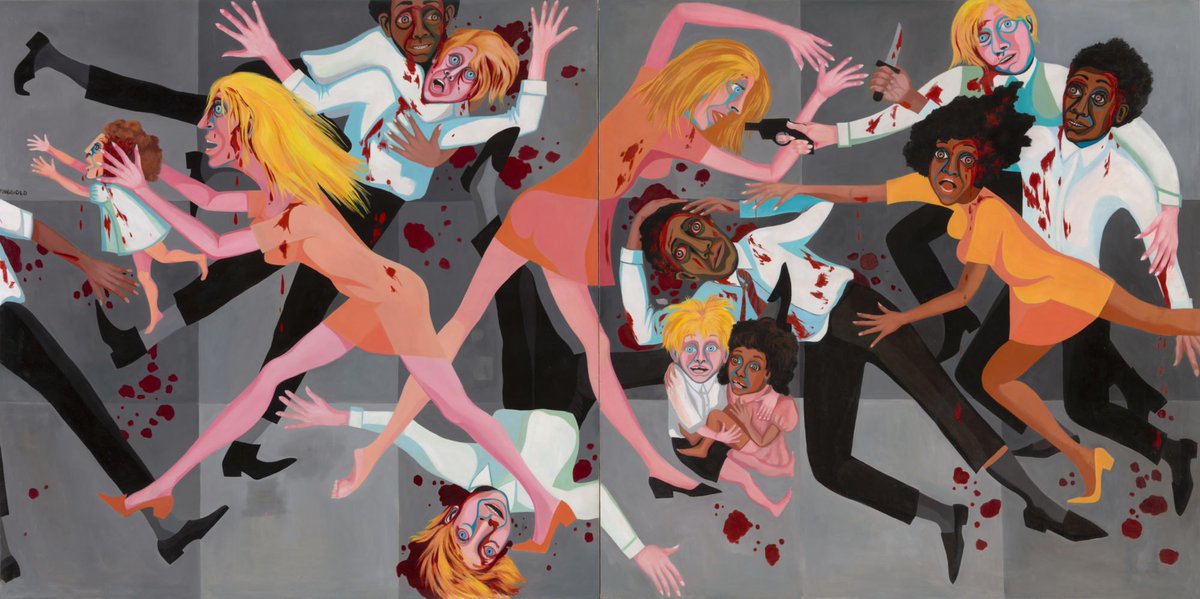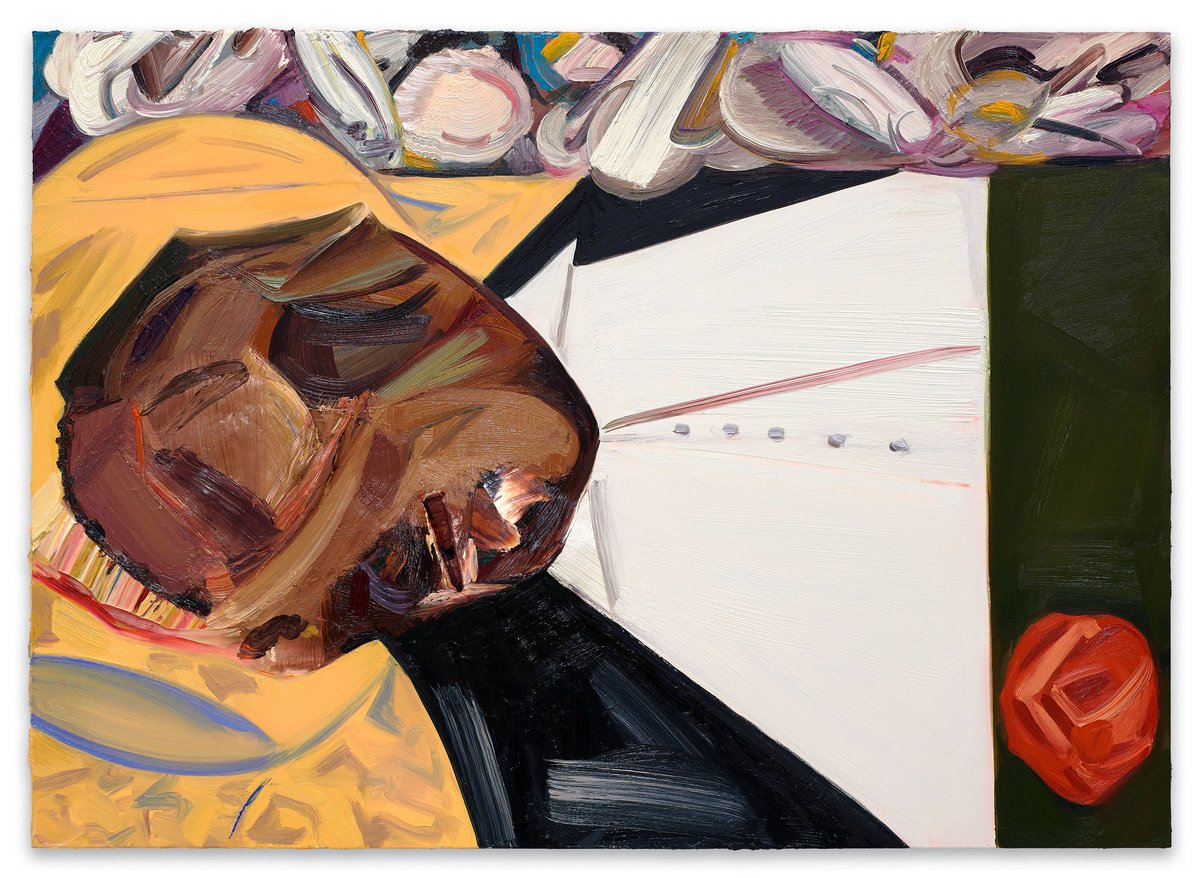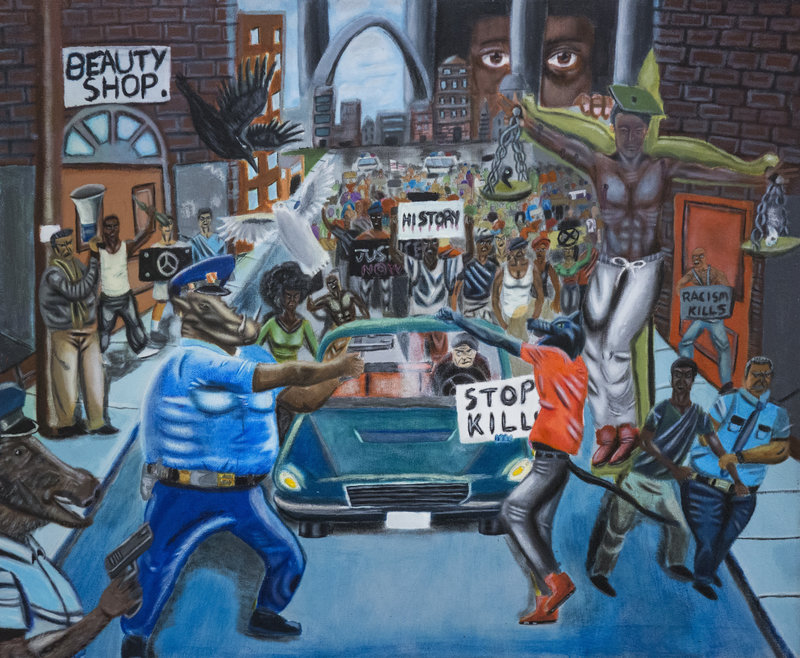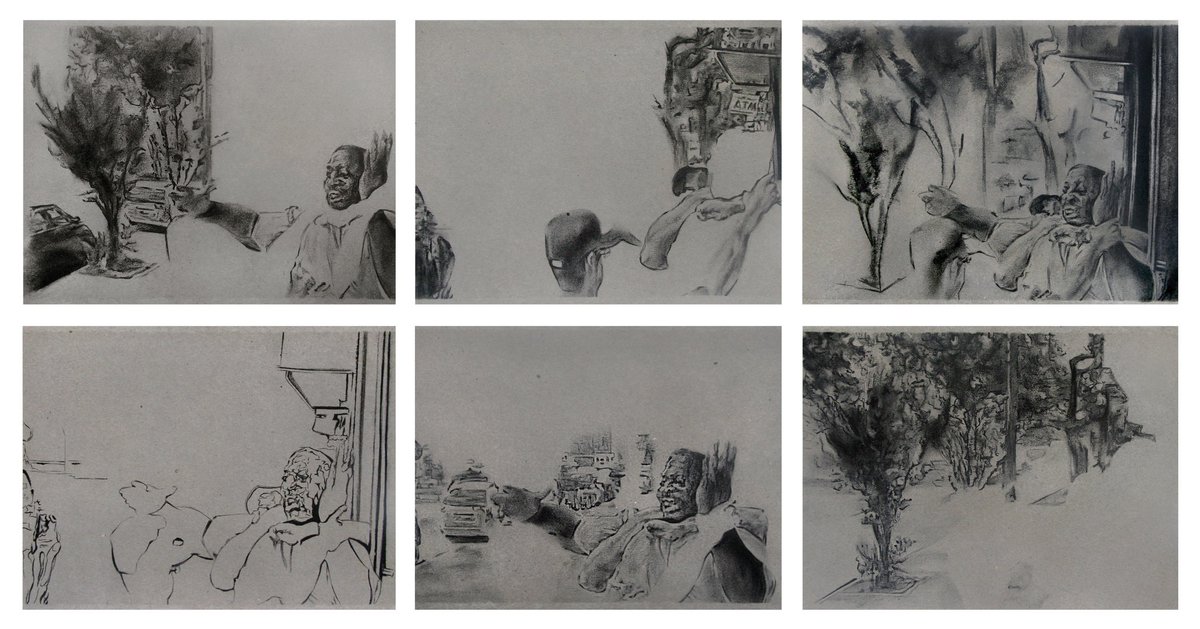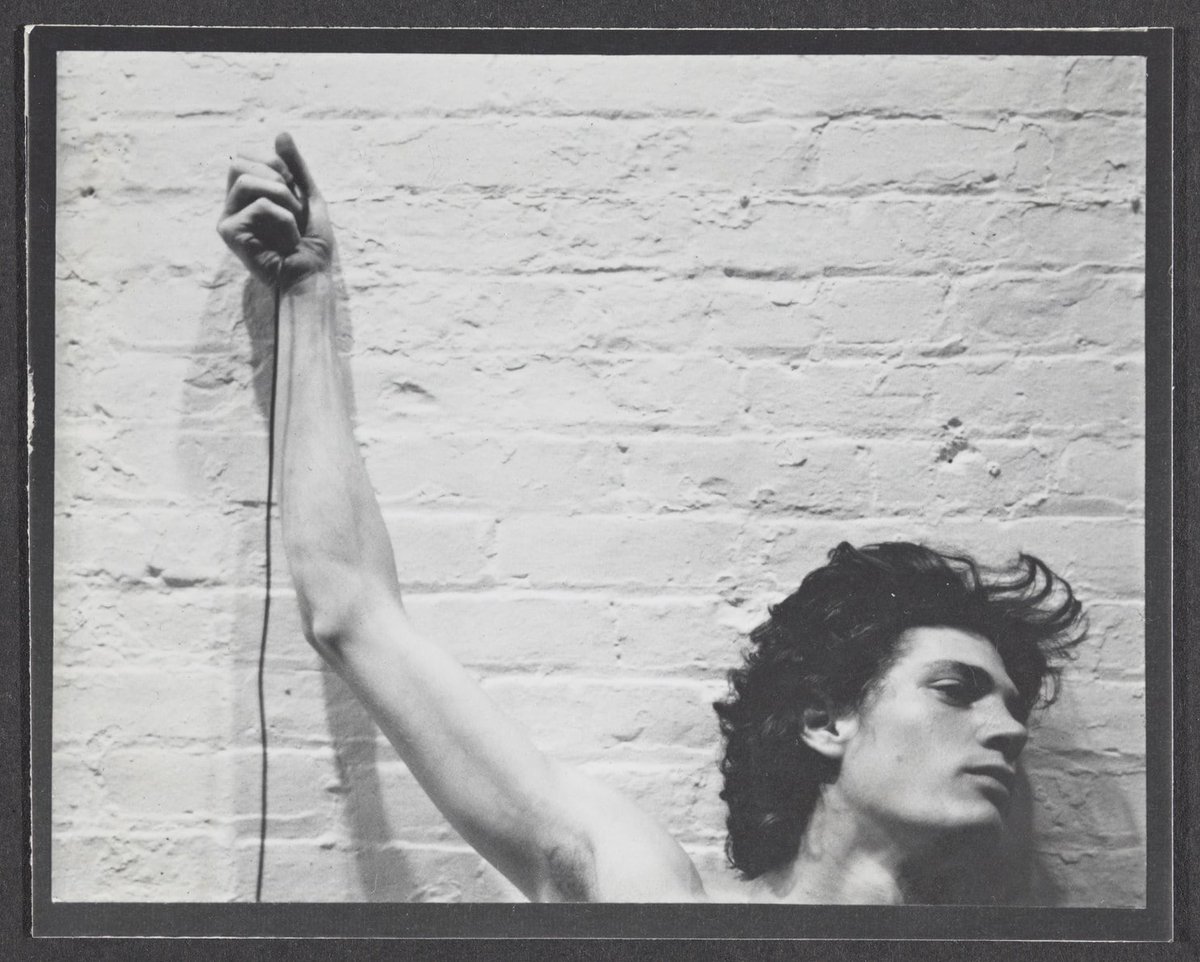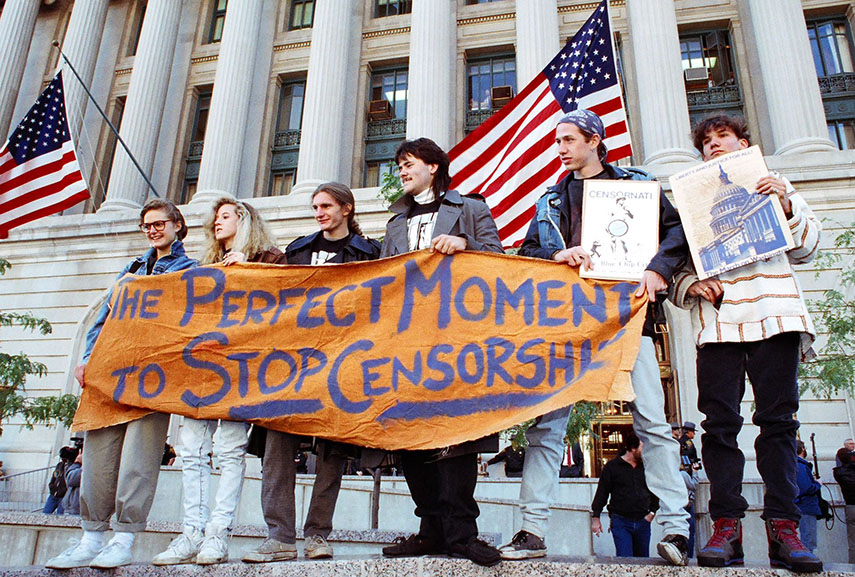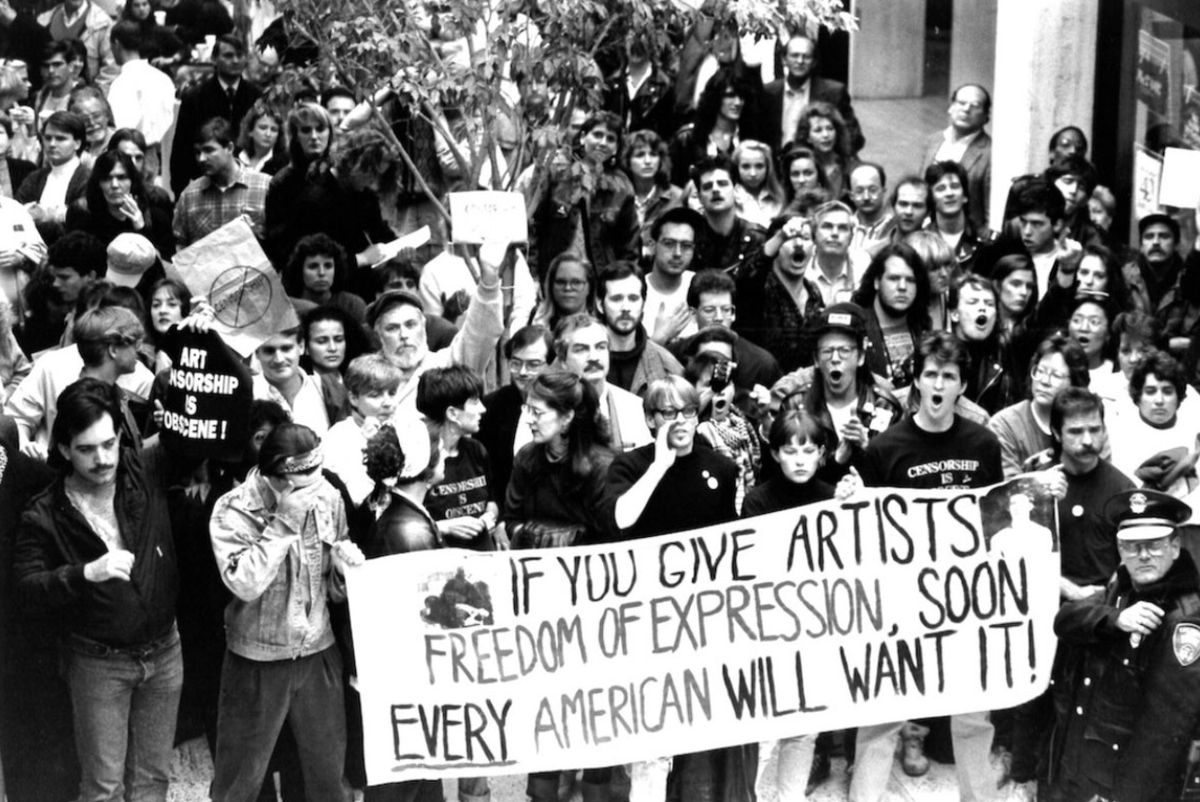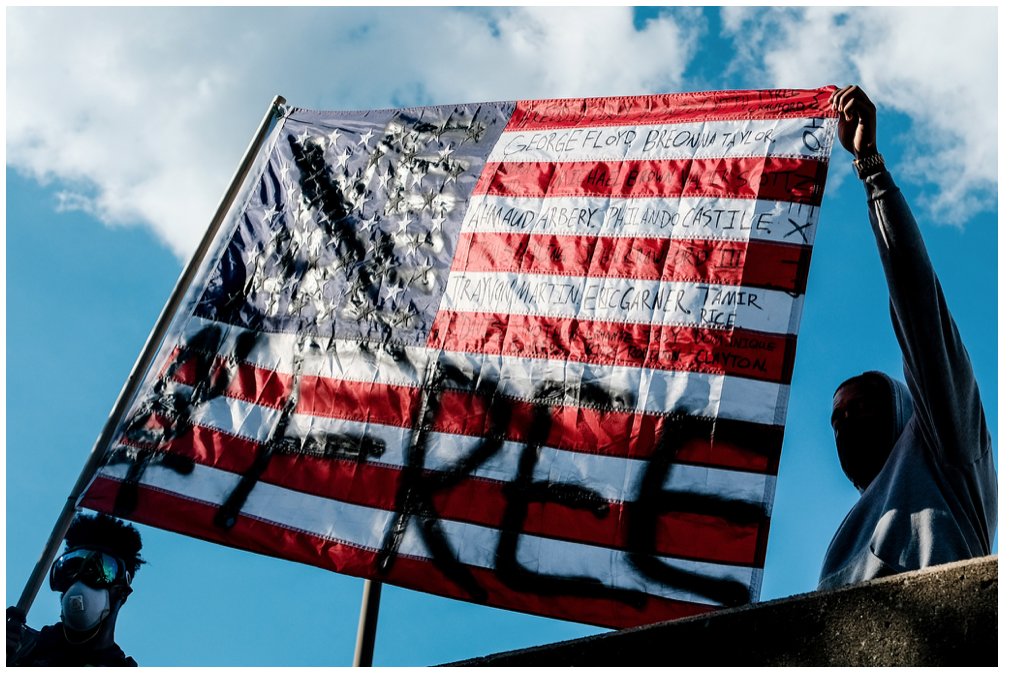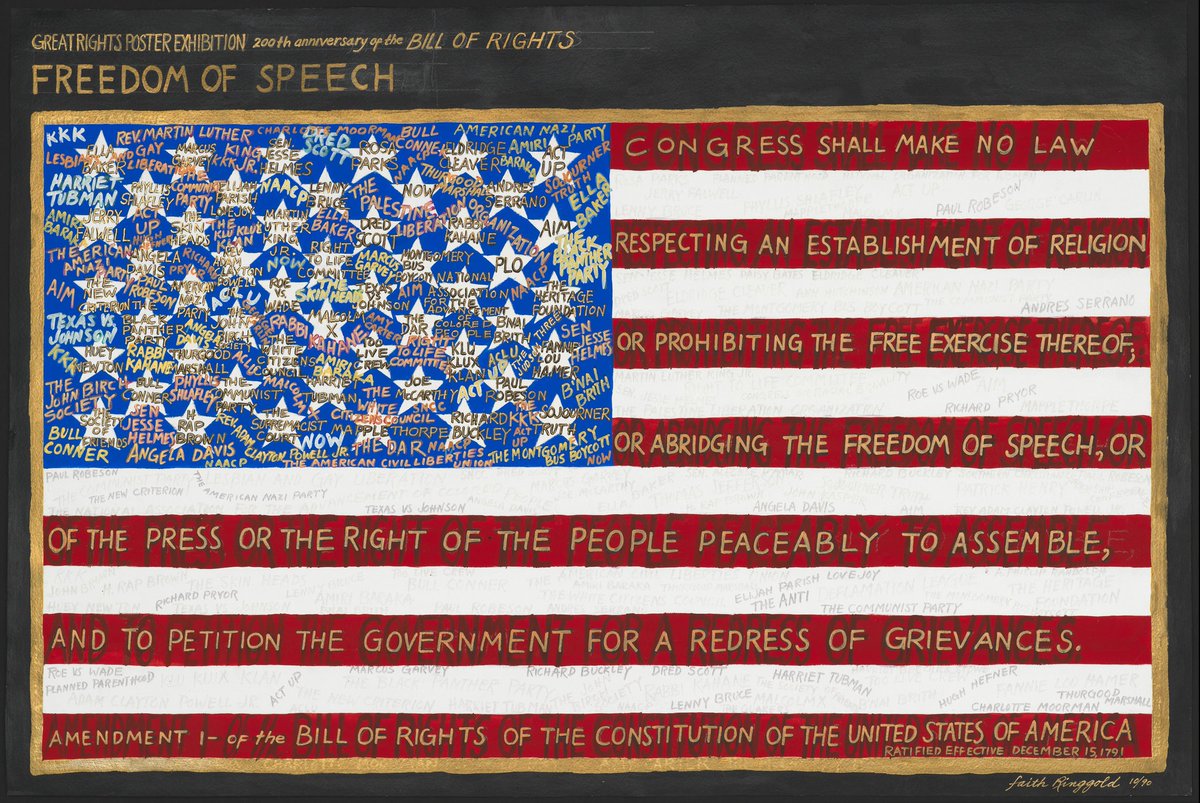I want to comment on the issue of free expression at art museums. In general, I don’t think art museums should *ever* yield to people demanding that work they find offensive be taken down. 1/
Museums do not have to put anything on display. They can choose what to display or not. There is no right to appear in a museum, and a museum choosing not to show work is not perforce problematic. 2/
But like disinvitations of invited speakers, if a museum yields to a vocal mob demanding something be taken down, it undercuts a crucial principle so necessary to art, artists, and museums. It’s best to defend this principle of freedom of expression. 3/
The image in tweet #3 – subversive, wry, and uplifting – is from Faith Ringgold. https://www.nytimes.com/2020/06/11/arts/design/faith-ringgold-art.html We are all fortunate that she has found her powerful voice again during this time of protest against police brutality. 4/
Lately, this topic of museum censorship has centered on race and free speech – alas, a combustible mix that too often winds up harming both the cause of racial justice and the defense of free expression. 5/
MLK appreciated this so well, in his awe-inspiring last speech before he was assassinated defending the principle of free speech here: https://kinginstitute.stanford.edu/encyclopedia/ive-been-mountaintop 6/
There have been many cases like this. There was 2017 case of the painting (“Open Casket”) of Emmet Till by Dana Schutz. I clearly think a white artist should be able to paint such a thing, for the very reasons related to #ourcommonhumanity she offers: https://www.nytimes.com/2017/03/21/arts/design/painting-of-emmett-till-at-whitney-biennial-draws-protests.html 7/
And, I totally support the protest of the painting by Parker Bright at the museum, too. It's fine to protest and object to art. It's just not good for museum to take down art as a result. 8/
What a powerful combined message that the painting, the protest, and the fact that here we are, years later, talking about them both sends. What a profound and haunting act of Emmet Till's mother to allow an open casket in the first place. 9/
How are we to understand each other in our society, if not through communicating with each other – with art, music, words? How can we say that only A can talk about A and B can talk about B? What a dehumanizing and un-civic stance that would be. 10/
And there was this powerful 2015 protest art where (as it turns out) black students had put “White Only” and “Black Only” signs near elevators, water fountains, and bathrooms on a campus: https://www.theatlantic.com/politics/archive/2015/12/art-on-campus/418116/ 11/
Some activists wanted the disturbing signs taken down and others wanted them left up. Who should be heeded? What a powerful protest against racism this was if, with a few flyers, the students were able to move the conversation on campus and also garner national attention! 12/
Is that not a function of art? To make us think, feel, talk, and act?
(Here is a non-museum example in this vein that I supported: https://www.npr.org/2017/01/10/509168850/student-painting-depicting-cops-as-animals-sparks-tensions-on-capitol-hill) 13/
(Here is a non-museum example in this vein that I supported: https://www.npr.org/2017/01/10/509168850/student-painting-depicting-cops-as-animals-sparks-tensions-on-capitol-hill) 13/
Which brings me to this recent case now in the news, involving the artist Shaun Leonardo at the Cleveland MOCA: https://www.nytimes.com/2020/06/09/arts/design/moca-cleveland-shaun-leonardo.html?smid=nytcore-ios-share 14/
Museum administrators, at the Cleveland Museum, who put up his powerful show (to the artist’s delight) yielded to protesters to take it down, on the grounds that it was hurtful and offensive. And the administrators apologized! So absurd. 15/
But then *other* protesters and the artist himself objected to the show being cancelled (especially since Leonardo wasn't consulted). And then the museum apologized the them, too. What a mess. 16/
Far better would it have been to defend principle that, once we put up art for a show, even if someone objects, we don’t take it down. Because to do so would only encourage protests with the object of reducing free expression. Again: protest is fine. Taking down art is not. 17/
Art suffers, free expression suffers, society suffers when we let a vocal group restrict what others can see. 18/
Don’t like what’s in a museum or in an art show? Don’t go. Upset by something disturbing you stumble on in a museum? Work on developing fortitude. Because otherwise you couldn't go to the Holocaust Museum or the Museum of African American History either (and you should). 19/
It’s too bad that this topic has come to be so connected to matters of race. But it wasn't always so. In 1990, another museum in Ohio, in Cincinnati, faced an obscenity trial for putting on a show of photographs by Robert Mapplethorpe. 20/
Some of the photographs were pornographic, others disturbing, some moving, all amazingly composed and lovingly and thoughtfully created. https://www.washingtonpost.com/entertainment/museums/25-years-later-cincinnati-and-the-obscenity-trial-over-mapplethorpe-art/2015/10/22/07c6aba2-6dcb-11e5-9bfe-e59f5e244f92_story.html 21/
The Cincinnati Museum, to its great credit, refused to take the show down (unlike the Corcoran, that had!), despite the protests. It defended itself in court. Others defended it too. Just look at these protests defending freedom of expression! https://www.widewalls.ch/magazine/mapplethorpe-obscenity-trial-25-years 22/
And the museum was acquitted.
While no member of the jury had ever been to an art museum, this cross-section of eight “regular Americans,” when interviewed afterwards, explained their verdict very simply:
“Censorship is un-American,” they said. 23/
While no member of the jury had ever been to an art museum, this cross-section of eight “regular Americans,” when interviewed afterwards, explained their verdict very simply:
“Censorship is un-American,” they said. 23/
Apparently, International Association of Art Critics @AICA_USA just took down a forum discussing how to protect museums & even free expression while endorsing recent protests. http://www.artblog.net/post/2020/06/aica-usa/ Another example of loss of nuance & harmful conflation of multiple topics. 24/
Imagine people objecting to these powerful photos on grounds that they were offensive. Would a museum not show them? And, note the independent creation of a work of art by the protesters similar to one created by Faith Ringgold above. https://www.1843magazine.com/1843/behind-the-news/portraits-of-protest-in-america via @TheEconomist 25/
Another example of art being wholly misinterpreted and wrongly being removed (here, “postponed”) from view https://news.artnet.com/exhibitions/philip-guston-retrospective-postponed-1910658/amp-page?__twitter_impression=true. Indeed, in this case, Guston painted these abstract figures to criticize them. Via @artnet 26/
In a wrinkle regarding Guston show cancellation (which I disagree with), a trustee of the National Gallery, @darrenwalker, a man I know and admire (though I disagree with him on this matter), used the phrase "tone deaf" in justifying the decision & has come under fire for it. 27/
Walker said that "the four museums would have appeared tone deaf to what is happening in public discourse about art” had they not cancelled the show. It's a fair statement and an innocent use of the phrase "tone deaf." https://www.washingtonpost.com/entertainment/museums/national-gallery-postpones-major-philip-guston-show/2020/09/25/d486fb04-ff54-11ea-8d05-9beaaa91c71f_story.html 28/
Walker was criticized for this and now apologized for using phrase "tone deaf" https://twitter.com/darrenwalker/status/1310659341687586818?s=20
But these incidents do not always unfold as one might think. Many people have argued in past situations involving "word crime" that intent or past history do not matter. 29/
But these incidents do not always unfold as one might think. Many people have argued in past situations involving "word crime" that intent or past history do not matter. 29/
The issue is not so much the words a person uses to advance an argument (eg, should Guston show proceed?), but rather the *content* of the argument. Warren might be right or wrong, from a curatorial standpoint, that show should be cancelled. That is the primary issue at hand. 30/
I know I would profit from a conversation with @darrenwalker about all these matters, and I might find myself seeing things differently as a result. But Walker does not warrant being taken to task simply for an innocent choice of words. And his intent and past history matter. 31/
How about that! Group of elite artists objects to censoriousness (in a kind of #harpersletter for artists). Kudos. Of course the Guston show should go on.
And one truly proves one’s defense of free expression by defending art one actually objects to.
https://www.nytimes.com/2020/09/30/arts/design/philip-guston-shows-open-letter.html 32/
And one truly proves one’s defense of free expression by defending art one actually objects to.
https://www.nytimes.com/2020/09/30/arts/design/philip-guston-shows-open-letter.html 32/
The proper response to a mural or a work of art you do not like is to peacefully protest it or draw your own mural, not to make threats of violence.
UNC Asheville issues shelter in place order due to direct threat to community members. http://thebluebanner.net/unc-asheville-issues-shelter-in-place-order-due-to-direct-threat-to-community-members/ 33/
UNC Asheville issues shelter in place order due to direct threat to community members. http://thebluebanner.net/unc-asheville-issues-shelter-in-place-order-due-to-direct-threat-to-community-members/ 33/
Case raises many issues: 1) Destroying art is bad. 2) Removing art now deemed offensive should be rare (the "caricaturing" seems to apply to whole image); better to add more murals. 3) private property owners should be able to decide for themselves. https://www.vnews.com/Artist-sues-VLS-over-planned-removal-of-mural-37738364 34/

 Read on Twitter
Read on Twitter